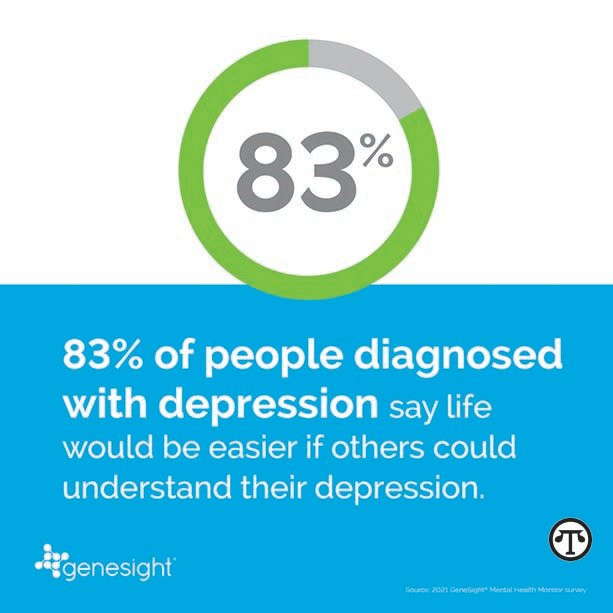 Post Classifieds
Post Classifieds
Depression Disconnect: New Survey Finds Most People with Depression Feel Deeply Misunderstood

(NAPSI)—A new nationwide poll, the GeneSight Mental Health Monitor, has found more than 8 in 10 people diagnosed with depression say life would be easier if others could understand their depression. Yet, most people who have not experienced depression may not be able to understand the challenges, including its treatment.
This is important news about a serious disease affecting more than 17 million Americans each year, according to the National Institute of Mental Health.
“Depression is one of the most misunderstood disorders. When people misinterpret depressed patients as ‘lazy’ or ‘dramatic,’ they are vastly underestimating and misunderstanding the debilitating symptoms of major depressive disorder,” said Mark Pollack, M.D., chief medical officer for the GeneSight test at Myriad Genetics.
Seeking Support from Loved Ones
According to the survey, three in four depressed people said they wanted support from their loved ones—including just listening or saying supportive things such as: “How can I help?” or “Do you want to talk about it?” Instead, nearly half of those with depression said they were more likely to hear statements like “You need to get over it/snap out of it” or “We all get sad sometimes.”
This lack of meaningful support represents a significant disconnect among those who suffer from depression and those who do not.
This May, in observance of Mental Health Month, GeneSight and the Depression and Bipolar Support Alliance (DBSA) are working to raise awareness of the symptoms of major depressive disorder and how those symptoms make it hard to seek treatment.
“Depression affects how a person feels, thinks, and acts. Though typically characterized by feelings of sadness, depression symptoms may appear as irritability or apathy,” explains Dr. Michael Thase, professor of psychiatry, Perelman School of Medicine and the Corporal Michael J. Crescenz VA Medical Center, and DBSA scientific advisory board member.
Nearly half of those surveyed who were either diagnosed with depression or concerned they may have it say they would feel embarrassed if others found out.
“Misunderstanding the disorder may lead to people feeling embarrassed and/or unwilling to seek the treatment they need,” said Dr. Thase.
Advances in Depression Treatment May Help
The poll also found that more than half of those diagnosed with depression began taking a new medication since the beginning of the pandemic. For some, starting a new depression medication doesn’t guarantee success:
•Half of those diagnosed with depression have tried four or more depression medications in their lifetime.
•4 in 10 are not confident their depression medications work and 7 in 10 would feel “hopeful” if their doctor recommended a genetic test as part of their treatment plan.
Genetic testing, like the GeneSight test, can provide insight to clinicians about a patient’s unique genes and how they may affect outcomes with medication commonly prescribed to treat depression, anxiety and other psychiatric conditions.
“With just a simple cheek swab, the test provides information about which medications may require dose adjustments, may be less likely to work, or may have an increased risk of side effects,” said Dr. Pollack. “It’s one of many tools in a physician’s toolbox that may help get patients on the road to feeling more like themselves again.”
Conquering the Depression Disconnect
Only half of adults polled said they are very confident they can recognize if a loved one is suffering from depression. One answer is to virtually experience a “day in the life” and a few of the symptoms of living with depression. You can do that at www.KnowMental-Health.com.
Learn More
For more information on how genetic testing can help inform treatment decisions for depression and other mental health disorders, visit genesight.com.
On the Net:North American Precis Syndicate, Inc.(NAPSI)
Get Top Stories Delivered Weekly
Discuss This Article
MOST POPULAR THE CONCORDIAN

"Bohemian Rhapsody" Will Rock You By Laura Buchanan

"Fallout 76": A Small State in a Big Game By Caleb Zopp

"Girl in the Spider's Web": A Must-See for Men and Women By Savannah Cooper

"The Grinch": More Science Than Art By Shannon C. White
GET TOP STORIES DELIVERED WEEKLY
FOLLOW OUR NEWSPAPER
LATEST THE CONCORDIAN NEWS
- Campus Carry Bill Receives Opposition from College Leaders
- "Bohemian Rhapsody" Will Rock You
- "Fallout 76": A Small State in a Big Game
- "Girl in the Spider's Web": A Must-See for Men and Women
- "The Grinch": More Science Than Art
- Hand, Foot, and Mouth Disease Spreads on College Campuses
- Concord Senior Oral Frazier Signs Book Deal
RECENT THE CONCORDIAN CLASSIFIEDS
OUTSIDE THE LINES
- Effortless Holiday Hosting: Simple Tips to Keep Your...
- There’s More To Vision Health Than Meets the Eye
- Medications and Wellness Essentials Delivered to Your...
- Understanding Spam—And How To Stop It
- 1 in 5 Vehicles on the Road Has an Open Recall—Yours C...
- A Difficult Diagnosis Sparks Hope and Support for...
- Fall For Improved Vehicle Protection
- Six Ways To Save Money This Holiday Season
- BigFuture Resources Help Students Discover College,...
- Anheuser-Busch Celebrates American Growers on National...
FROM AROUND THE WEB
- BookTrib's Bites: Four Enthralling Autumn Reads
- Trump's Flawed Tariff Proposal
- How Artificial Intelligence Intersects with Energy
- 6 Reasons Fiberglass is the Pool Material of Choice for...
- BookTrib’s Bites: Four Unforgettable Reads
- Navigating “Gramnesia” This Holiday Season
- BookTrib’s Bites: Dive Into These Four Exciting Fall Reads
- Easy Monster Margarita is No Trick, All Treat
- Help Marine Toys for Tots Deliver Hope to Children in...
- 5 Tips to Pick the Right Dental Plan



